重庆市北大附中重庆实验学校高三英语高考英语语法课件:代词
文档属性
| 名称 | 重庆市北大附中重庆实验学校高三英语高考英语语法课件:代词 | 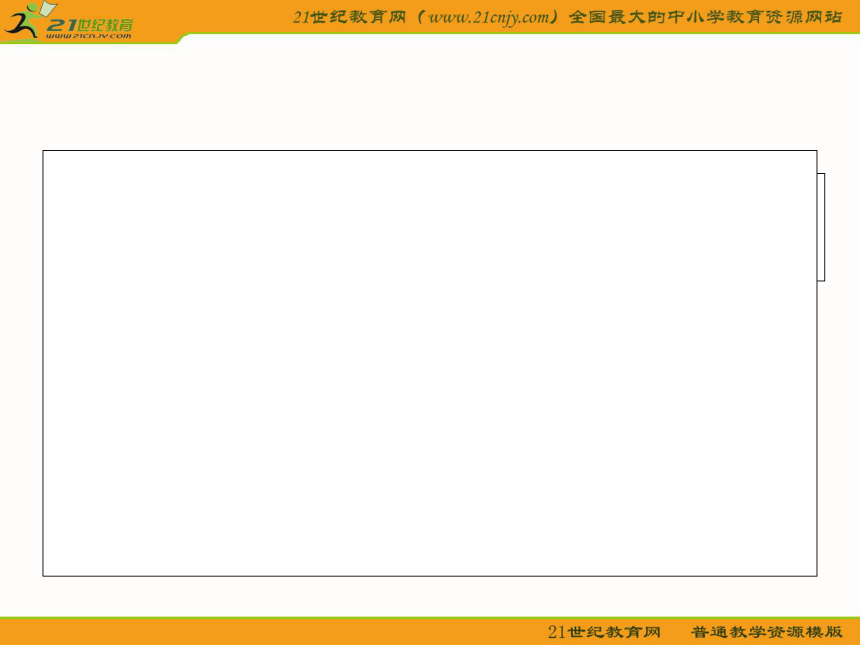 | |
| 格式 | zip | ||
| 文件大小 | 261.6KB | ||
| 资源类型 | 教案 | ||
| 版本资源 | |||
| 科目 | 英语 | ||
| 更新时间 | 2012-05-29 10:56:01 | ||
图片预览

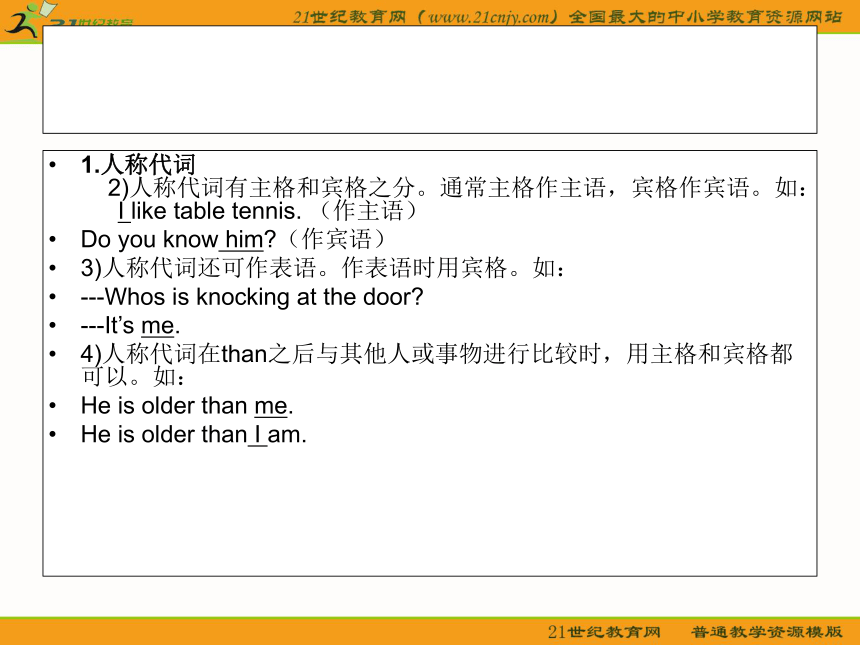
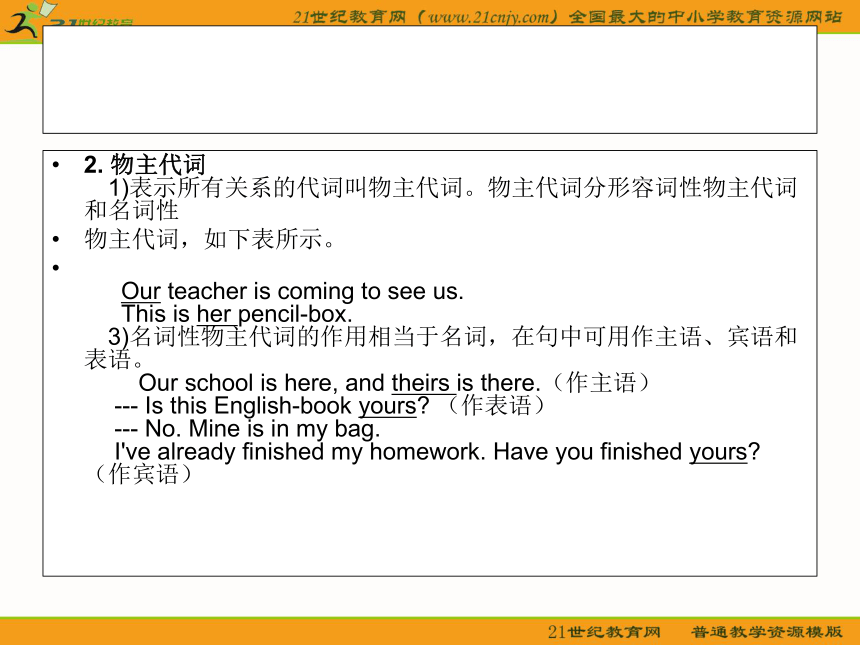
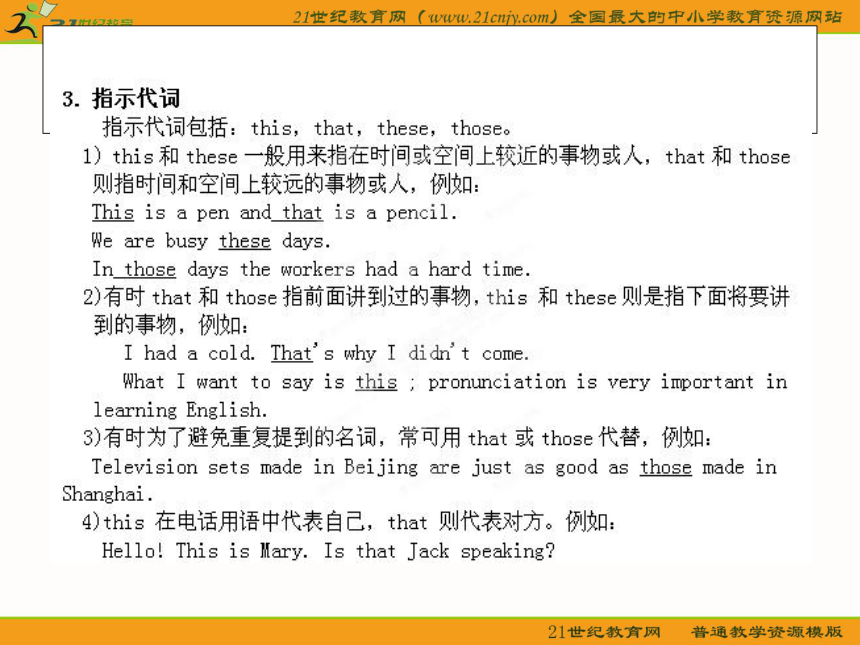
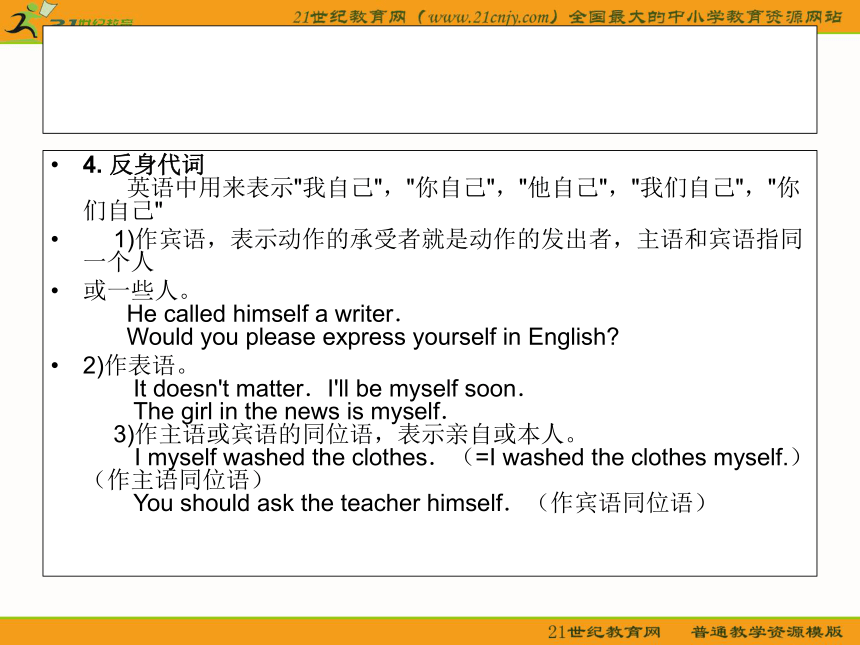
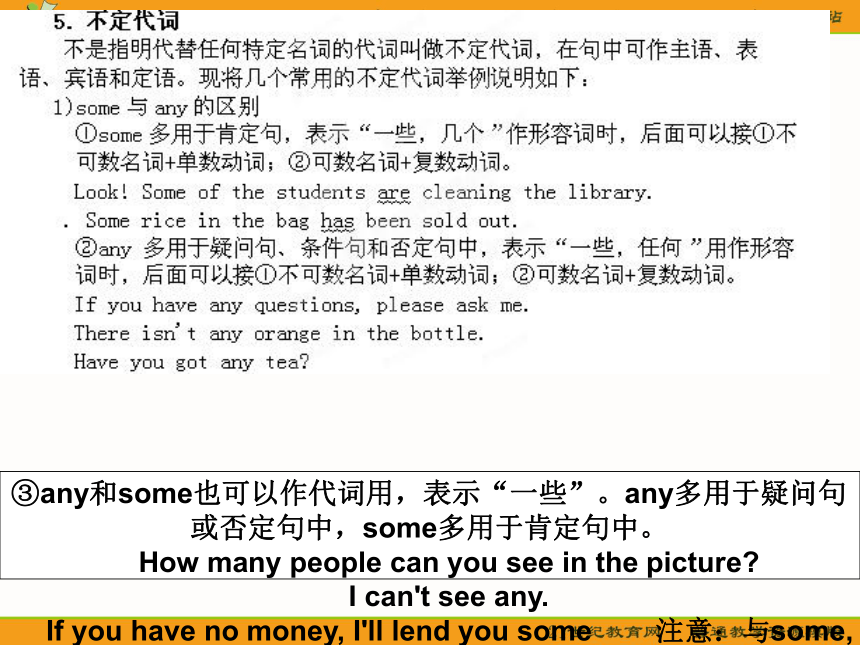
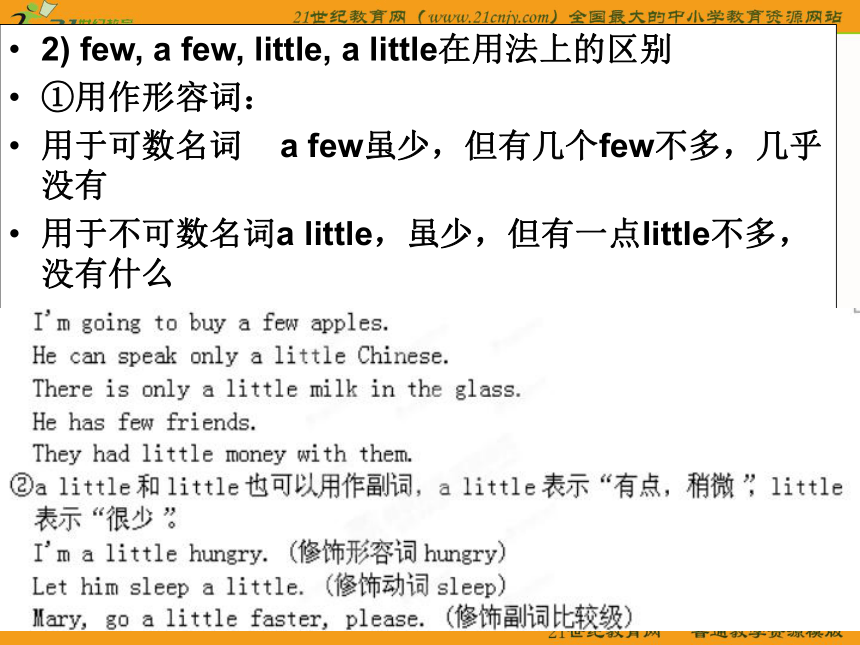
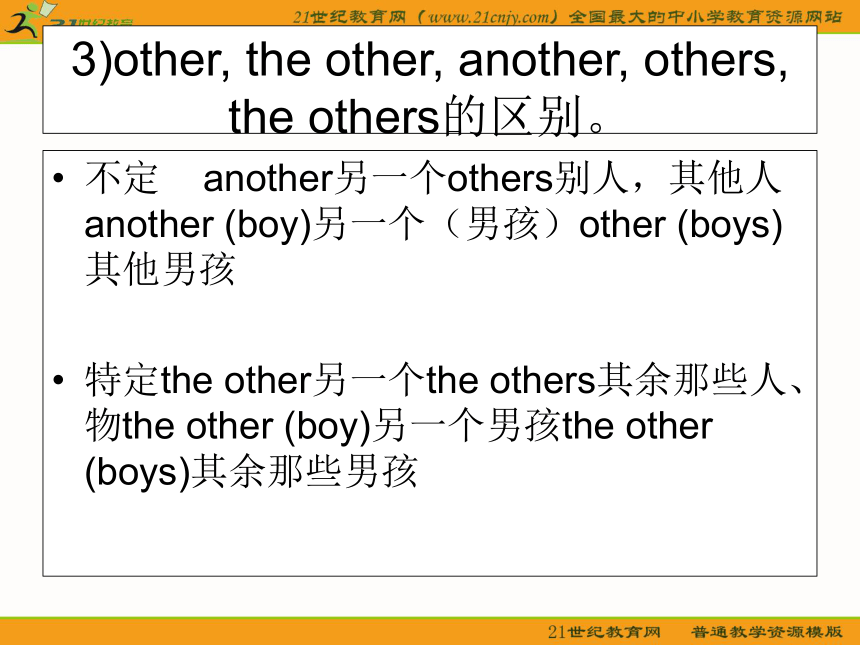
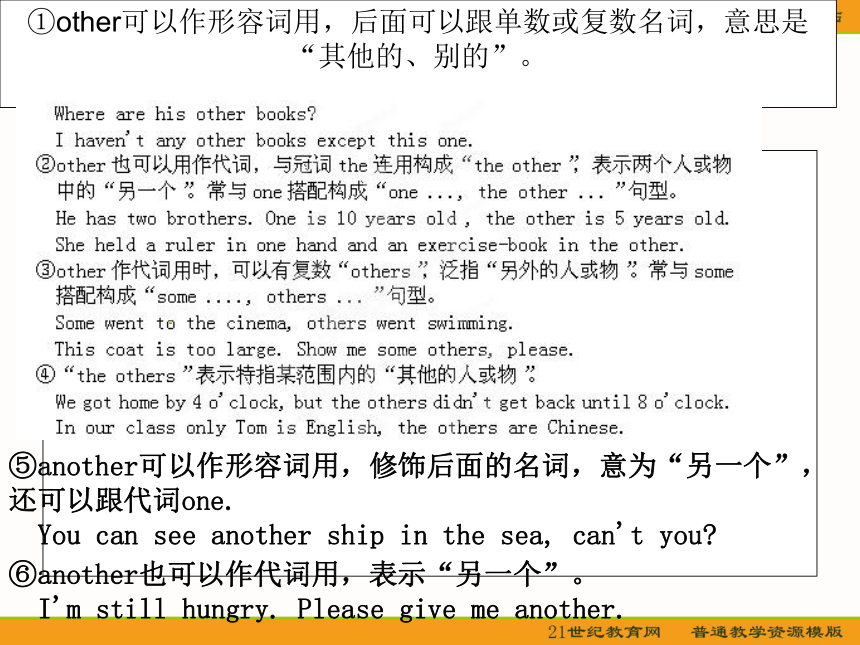
文档简介
(共20张PPT)
一.概念:
代词是代替名词的词, 按其意义、特征及其在句中的作用分为:人称代词、物主代词、指示代词、反身代词、相互代词、疑问代词、不定代词和关系代词等。
1.人称代词 2)人称代词有主格和宾格之分。通常主格作主语,宾格作宾语。如: I like table tennis. (作主语)
Do you know him (作宾语)
3)人称代词还可作表语。作表语时用宾格。如:
---Whos is knocking at the door
---It’s me.
4)人称代词在than之后与其他人或事物进行比较时,用主格和宾格都可以。如:
He is older than me.
He is older than I am.
2. 物主代词 1)表示所有关系的代词叫物主代词。物主代词分形容词性物主代词和名词性
物主代词,如下表所示。
Our teacher is coming to see us. This is her pencil-box. 3)名词性物主代词的作用相当于名词,在句中可用作主语、宾语和表语。 Our school is here, and theirs is there.(作主语) --- Is this English-book yours (作表语) --- No. Mine is in my bag. I've already finished my homework. Have you finished yours (作宾语)
4. 反身代词 英语中用来表示"我自己","你自己","他自己","我们自己","你们自己"
1)作宾语,表示动作的承受者就是动作的发出者,主语和宾语指同一个人
或一些人。 He called himself a writer. Would you please express yourself in English
2)作表语。 It doesn't matter.I'll be myself soon. The girl in the news is myself. 3)作主语或宾语的同位语,表示亲自或本人。 I myself washed the clothes.(=I washed the clothes myself.)(作主语同位语) You should ask the teacher himself.(作宾语同位语)
③any和some也可以作代词用,表示“一些”。any多用于疑问句或否定句中,some多用于肯定句中。
How many people can you see in the picture
I can't see any.
If you have no money, I'll lend you some 注意:与some, any结合的词如something, somebody, someone, anything, anyone, anybody在肯定句、否定句、疑问句、条件句中的用法,大致和some, any的用法相同。
2) few, a few, little, a little在用法上的区别
①用作形容词:
用于可数名词 a few虽少,但有几个few不多,几乎没有
用于不可数名词a little,虽少,但有一点little不多,没有什么
3)other, the other, another, others, the others的区别。
不定 another另一个others别人,其他人another (boy)另一个(男孩)other (boys)其他男孩
特定the other另一个the others其余那些人、物the other (boy)另一个男孩the other (boys)其余那些男孩
①other可以作形容词用,后面可以跟单数或复数名词,意思是“其他的、别的”。
⑤another可以作形容词用,修饰后面的名词,意为“另一个”,还可以跟代词one.
You can see another ship in the sea, can't you
⑥another也可以作代词用,表示“另一个”。
I'm still hungry. Please give me another.
4)every与each的区别。
Each every
1)可单独使用 1)不可单独使用
2)可做代名词、形容词 2)仅作形容词
3)着重“个别” 3)着重“全体”,毫无例外
4)用于两者或两者以上中的每一个人或物4)用于三者或三者以上每一个人或物
The teacher gave a toy to each child.
Each ball has a different colour.
当我们说each child, each student或each teacher时,我们想到的是一个人的情况。而当我们说every child和every student时,我们想到的是全体的情况,every的意思与all接近,表示他们都如此。
Every child likes playing. = All children like playing.
Lucy and Lily both agree with us.
They both
passed on their sticks at the same time.
How are your parents They're both fine.
b.与“of +代词(或名词)”连用,表示“两者都”。
Both of them came to see Mary.
Both of the books are very interesting.
c.单独使用,表示“两者(都)”。
Michael has two sons. Both are clever.
I don't know which book is the better, I shall read both.
③both用作形容词,放在名词之前,修饰该名词,表示“两者都”。
Both his y
ounger sisters are our classmates.
. There are tall trees on both sides of the street.
6. 相互代词
7. 疑问代词
疑问代词有who,whom,whose,what和which等。疑问代词用于特殊疑
问句中,一般都放在句首,并在句子中作为某一句子成分。例如:
Who is going to come here tomorrow (作主语)
What is that (作表语)
Whose umbrella is this (作定语)
Whom are you waiting for (作宾语)
1. Tom, Please pass ________ the glasses. I want to read the newspapers.
A. you B. me C. him D. her
2. The English novel is quite easy for you. There are ______ new words in it.
A. a little B. little C. a few D. few
13. ---Do you live by yourself, Mr Wang
---Yes. I have two sons. But ______ of them lives with me. They are now studying in America
A. neither B. both C. none D. either
14. ---Have you sent your parents an E-mail telling them you arrived safe
---No. _______ of them can use a computer.
A. None B. Both C. Neither D. All
15. Who taught ____ English last term Was ___ Mr. Smith
A. you; it B. you; he C. your; it D. your; that
16. ---That woman has a bag in her right hand. What’s in her _____ hand
A. another B. other C. one D. the other
17. We decided to go for a field trip with some friends of__.
A. us B. our C. ours D. ourselves
18. ---Is there a bus to the zoo
---I’m afraid there’s _______ bus to the zoo.
A. no B. any C. some D. none
19. You forgot your dictionary You may have _______.
A. me B. my C. mine D. myself
20. This is ______ classroom. Where is _______
our; them B. us; they C. our; theirs D. ours; theirs
一.概念:
代词是代替名词的词, 按其意义、特征及其在句中的作用分为:人称代词、物主代词、指示代词、反身代词、相互代词、疑问代词、不定代词和关系代词等。
1.人称代词 2)人称代词有主格和宾格之分。通常主格作主语,宾格作宾语。如: I like table tennis. (作主语)
Do you know him (作宾语)
3)人称代词还可作表语。作表语时用宾格。如:
---Whos is knocking at the door
---It’s me.
4)人称代词在than之后与其他人或事物进行比较时,用主格和宾格都可以。如:
He is older than me.
He is older than I am.
2. 物主代词 1)表示所有关系的代词叫物主代词。物主代词分形容词性物主代词和名词性
物主代词,如下表所示。
Our teacher is coming to see us. This is her pencil-box. 3)名词性物主代词的作用相当于名词,在句中可用作主语、宾语和表语。 Our school is here, and theirs is there.(作主语) --- Is this English-book yours (作表语) --- No. Mine is in my bag. I've already finished my homework. Have you finished yours (作宾语)
4. 反身代词 英语中用来表示"我自己","你自己","他自己","我们自己","你们自己"
1)作宾语,表示动作的承受者就是动作的发出者,主语和宾语指同一个人
或一些人。 He called himself a writer. Would you please express yourself in English
2)作表语。 It doesn't matter.I'll be myself soon. The girl in the news is myself. 3)作主语或宾语的同位语,表示亲自或本人。 I myself washed the clothes.(=I washed the clothes myself.)(作主语同位语) You should ask the teacher himself.(作宾语同位语)
③any和some也可以作代词用,表示“一些”。any多用于疑问句或否定句中,some多用于肯定句中。
How many people can you see in the picture
I can't see any.
If you have no money, I'll lend you some 注意:与some, any结合的词如something, somebody, someone, anything, anyone, anybody在肯定句、否定句、疑问句、条件句中的用法,大致和some, any的用法相同。
2) few, a few, little, a little在用法上的区别
①用作形容词:
用于可数名词 a few虽少,但有几个few不多,几乎没有
用于不可数名词a little,虽少,但有一点little不多,没有什么
3)other, the other, another, others, the others的区别。
不定 another另一个others别人,其他人another (boy)另一个(男孩)other (boys)其他男孩
特定the other另一个the others其余那些人、物the other (boy)另一个男孩the other (boys)其余那些男孩
①other可以作形容词用,后面可以跟单数或复数名词,意思是“其他的、别的”。
⑤another可以作形容词用,修饰后面的名词,意为“另一个”,还可以跟代词one.
You can see another ship in the sea, can't you
⑥another也可以作代词用,表示“另一个”。
I'm still hungry. Please give me another.
4)every与each的区别。
Each every
1)可单独使用 1)不可单独使用
2)可做代名词、形容词 2)仅作形容词
3)着重“个别” 3)着重“全体”,毫无例外
4)用于两者或两者以上中的每一个人或物4)用于三者或三者以上每一个人或物
The teacher gave a toy to each child.
Each ball has a different colour.
当我们说each child, each student或each teacher时,我们想到的是一个人的情况。而当我们说every child和every student时,我们想到的是全体的情况,every的意思与all接近,表示他们都如此。
Every child likes playing. = All children like playing.
Lucy and Lily both agree with us.
They both
passed on their sticks at the same time.
How are your parents They're both fine.
b.与“of +代词(或名词)”连用,表示“两者都”。
Both of them came to see Mary.
Both of the books are very interesting.
c.单独使用,表示“两者(都)”。
Michael has two sons. Both are clever.
I don't know which book is the better, I shall read both.
③both用作形容词,放在名词之前,修饰该名词,表示“两者都”。
Both his y
ounger sisters are our classmates.
. There are tall trees on both sides of the street.
6. 相互代词
7. 疑问代词
疑问代词有who,whom,whose,what和which等。疑问代词用于特殊疑
问句中,一般都放在句首,并在句子中作为某一句子成分。例如:
Who is going to come here tomorrow (作主语)
What is that (作表语)
Whose umbrella is this (作定语)
Whom are you waiting for (作宾语)
1. Tom, Please pass ________ the glasses. I want to read the newspapers.
A. you B. me C. him D. her
2. The English novel is quite easy for you. There are ______ new words in it.
A. a little B. little C. a few D. few
13. ---Do you live by yourself, Mr Wang
---Yes. I have two sons. But ______ of them lives with me. They are now studying in America
A. neither B. both C. none D. either
14. ---Have you sent your parents an E-mail telling them you arrived safe
---No. _______ of them can use a computer.
A. None B. Both C. Neither D. All
15. Who taught ____ English last term Was ___ Mr. Smith
A. you; it B. you; he C. your; it D. your; that
16. ---That woman has a bag in her right hand. What’s in her _____ hand
A. another B. other C. one D. the other
17. We decided to go for a field trip with some friends of__.
A. us B. our C. ours D. ourselves
18. ---Is there a bus to the zoo
---I’m afraid there’s _______ bus to the zoo.
A. no B. any C. some D. none
19. You forgot your dictionary You may have _______.
A. me B. my C. mine D. myself
20. This is ______ classroom. Where is _______
our; them B. us; they C. our; theirs D. ours; theirs
